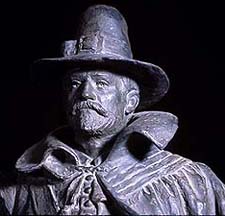He was only in his twenties when the awesome responsibility of governing a community was thrust upon him. Then, for 35 years of the next 40, he continued to lead that community, being reelected annually. That must mean he was doing something right.
His name was William Bradford, governor of the Pilgrim colony of Plymouth. He arrived on the Mayflower in 1620 along with a band of his fellow believers. In England, they were called Separatists because they didn’t want to belong to the state-sponsored church. For that stance, they were persecuted.
America was the opportunity to set up a colony and be able to do things the way they thought God commanded. Bradford, although young, led with increasing confidence.
He negotiated a treaty with his nearest neighbor, Chief Massasoit. That treaty lasted for more than 50 years, beyond the deaths of the two who fashioned it. He changed the farming system from a collectivist method to private enterprise. Immediately, initiative and industry thrived. As he later wrote about this change:
The failure of this experiment of communal living, which was tried for several years, and by good and honest men, proves the emptiness of the theory of Plato and other ancients—that the taking away of private property, and the possession of it in community . . . . would make a state happy and flourishing; as if they were wiser than God. . . .
Let none argue that this is due to human failing, rather than to this communistic plan of life in itself. I answer, seeing that all men have this failing in them, that God in His wisdom saw that another course was fitter for them.
In William Bradford, we have an American example of honest and godly government.

